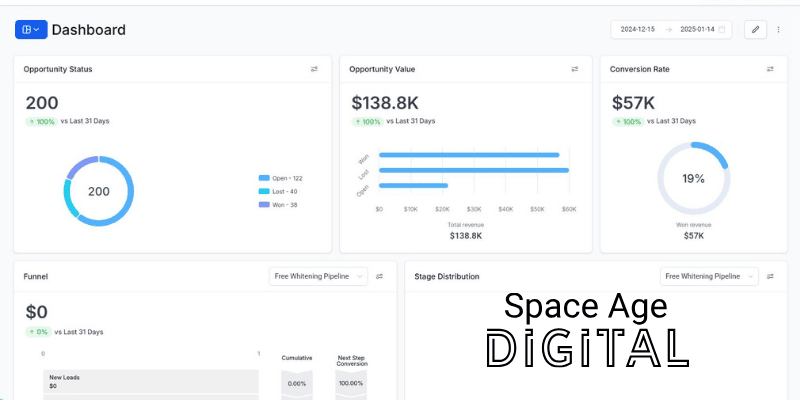
The Importance of Local SEO for Small Businesses
In today’s competitive digital landscape, small businesses must leverage every tool at their disposal to stand out and attract customers. One of the most powerful strategies available is local SEO (Search Engine Optimization). Local SEO focuses on optimizing your online presence to reach nearby customers searching for products or services like yours.
This guide explains why local SEO is critical for small businesses and provides actionable tips to help you succeed, including optimizing your Google Business Profile (GBP), using location-based keywords, and building local citations.
What Is Local SEO?
Local SEO is the process of improving your online visibility to attract customers in a specific geographic area. When someone searches for a service “near me” or includes a location in their search query, search engines prioritize businesses close to their location.
For example, a user searching for “best coffee shop in Washington, MO” will see results tailored to that area. By implementing local SEO, you ensure your business appears in these location-specific searches, increasing your chances of attracting nearby customers.
Why Local SEO Matters for Small Businesses
1. Increased Visibility
Local SEO ensures your business appears in local search results, making it easier for customers in your area to find you. This is especially important for mobile users who often search for businesses while on the go.
2. Higher Conversion Rates
Searches with local intent (e.g., “plumber near me”) often indicate a high level of purchase intent. According to Google, 76% of people who search for something nearby visit a business within a day.
3. Better Customer Trust
Appearing in local search results and having an optimized GBP builds trust with potential customers. They’re more likely to choose a business that is highly rated and visible in their area.
4. Cost-Effective Marketing
Unlike traditional advertising methods, local SEO allows you to target specific audiences without spending a fortune, making it an ideal strategy for small businesses with limited budgets.
Tips for Optimizing Your Google Business Profile (GBP)
Your Google Business Profile is a cornerstone of local SEO. An optimized GBP improves your visibility in Google Maps and local search results.
1. Claim and Verify Your Profile
Start by claiming your business on Google Business Profile. Follow the verification process to prove ownership of your business.
2. Complete All Information
Ensure your profile is fully completed with accurate details:
- Business name
- Address
- Phone number
- Business hours
- Website URL
- Business categories
3. Add High-Quality Photos
Photos of your storefront, products, and team can make your profile more engaging and trustworthy. Customers are more likely to visit businesses with well-maintained profiles.
4. Encourage Customer Reviews
Ask satisfied customers to leave reviews on your profile. Respond to all reviews, whether positive or negative, to show you value feedback.
5. Use Posts to Share Updates
Google Business Profile allows you to post updates about promotions, events, or new products. Regularly update your profile to keep customers informed and engaged.
Using Location-Based Keywords
Keywords are the foundation of any SEO strategy, and local SEO is no exception. Using location-based keywords helps search engines understand where your business operates and what you offer.
1. Include Location in Key Places
Incorporate your location into:
- Page titles (e.g., “Best Pizza in Washington, MO”)
- Meta descriptions
- Header tags (H1, H2, etc.)
- Content body
- Image alt text
- URLs (e.g., “www.yourbusiness.com/plumbing-washington-mo”)
2. Focus on Long-Tail Keywords
Long-tail keywords are more specific and easier to rank for. For example:
- “Best family restaurants in [City]”
- “Emergency plumbing services near me”
3. Optimize Blog Content
Write blog posts targeting local keywords, such as “Top 10 Attractions in [City]” or “How to Find Reliable Contractors in [Neighborhood].”
Building Local Citations
Local citations are online mentions of your business’s name, address, and phone number (NAP). Citations help search engines verify your business’s location and improve your local rankings.
1. Ensure Consistency
Make sure your NAP information is consistent across all platforms, including:
- Google Business Profile
- Social media profiles
- Local directories (e.g., Yelp, Yellow Pages)
2. List Your Business in Local Directories
Submit your business information to relevant directories, such as:
- Chamber of Commerce websites
- Industry-specific directories
- Review sites like Yelp and TripAdvisor
3. Use Data Aggregators
Data aggregators like Neustar Localeze, Foursquare, and Data Axle distribute your business information to other platforms, ensuring widespread visibility.
4. Monitor and Update Listings
Regularly check your listings to ensure they are accurate and up to date. Inaccurate information can confuse customers and harm your credibility.
Leveraging Reviews for Local SEO
Why Reviews Matter
Reviews not only build trust but also influence local search rankings. Google prioritizes businesses with high ratings and frequent reviews.
Tips for Getting More Reviews
- Ask Customers Directly: After completing a service, politely request a review.
- Make It Easy: Provide a direct link to your Google Business Profile.
- Offer Incentives: While you can’t pay for reviews, you can encourage participation with discounts or contests.
Respond to Reviews
Responding to reviews—both positive and negative—shows that you care about customer feedback. Keep responses professional and courteous.
Creating Locally-Focused Content
Content marketing is an excellent way to enhance your local SEO efforts. By creating content tailored to your local audience, you can establish yourself as an authority in your area.
Ideas for Locally-Focused Content
- City Guides: Create a guide for local attractions, events, or businesses.
- Customer Spotlights: Feature local customers who have benefited from your services.
- How-To Articles: Write tutorials related to your industry with a local twist (e.g., “How to Prepare Your Home for Winter in [City]”).
Tracking Your Local SEO Success
To measure the effectiveness of your local SEO efforts, use tools like:
- Google Analytics: Track website traffic and conversions.
- Google Search Console: Monitor keyword performance and search visibility.
- GBP Insights: View data on how customers find and interact with your business profile.
Pay attention to metrics like:
- Organic traffic growth
- Number of customer reviews
- Clicks on your website and call buttons
Conclusion: Take Charge of Your Local SEO
Local SEO is a powerful tool for small businesses looking to attract nearby customers and strengthen their online presence. By optimizing your Google Business Profile, using location-based keywords, and building local citations, you can ensure your business stands out in local searches.
If you’re ready to elevate your local SEO strategy, Space Age Mediaworks can help. Contact us today to learn how we can drive more customers to your door.
Keywords: local SEO, small business SEO, Google Business Profile optimization, location-based keywords, local citations













